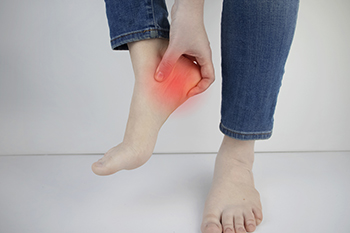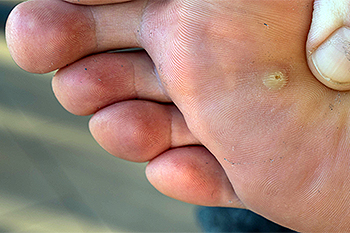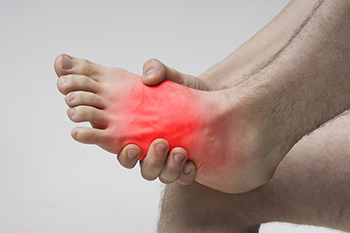Items filtered by date: July 2023
Rigid Versus Soft Orthotics

Different types of orthotics offer varying levels of support and relief for foot discomfort. Understanding the distinctions between rigid and soft orthotics can help you determine which type is best suited for your needs. Orthotics' stiffness depends on the materials used, such as flexible foam or solid hard plastic. While rigid orthotics provide enhanced stability and support, they may require a break-in period and are commonly made of hard plastic. They are ideal for conditions like plantar fasciitis or flat feet that require arch support. On the other hand, soft orthotics, typically composed of EVA, a soft elastic type of plastic, excel at relieving pressure on sensitive areas of the feet. Recommended for individuals engaged in high-impact sports, soft orthotics adapt to problem areas, cushion the feet, and provide arch support. If you experience foot discomfort, it is suggested that you consult with a podiatrist for an assessment that can help determine if orthotics are right for you and which type may offer the most benefits.
If you are having discomfort in your feet and would like to try orthotics, contact Gary Cockrell, DPM from Tennessee. Our doctor can provide the care you need to keep you pain-free and on your feet.
What Are Orthotics?
Orthotics are inserts you can place into your shoes to help with a variety of foot problems such as flat feet or foot pain. Orthotics provide relief and comfort for minor foot and heel pain but can’t correct serious biomechanical problems in your feet.
Over-the-Counter Inserts
Orthotics come in a wide variety of over-the-counter inserts that are used to treat foot pain, heel pain, and minor problems. For example, arch supports can be inserted into your shoes to help correct overarched or flat feet, while gel insoles are often used because they provide comfort and relief from foot and heel pain by alleviating pressure.
Prescription Orthotics
If over-the-counter inserts don’t work for you or if you have a more severe foot concern, it is possible to have your podiatrist prescribe custom orthotics. These high-quality inserts are designed to treat problems such as abnormal motion, plantar fasciitis, and severe forms of heel pain. They can even be used to help patients suffering from diabetes by treating foot ulcers and painful calluses and are usually molded to your feet individually, which allows them to provide full support and comfort.
If you are experiencing minor to severe foot or heel pain, it’s recommended to speak with your podiatrist about the possibilities of using orthotics. A podiatrist can determine which type of orthotic is right for you and allow you to take the first steps towards being pain-free.
If you have any questions please contact our offices located in Brentwood and Madison, TN . We offer the newest diagnostic and treatment technologies for all your foot and ankle needs.
Symptoms and Causes of Plantar Fasciitis

A band of tissue called the plantar fascia runs along the sole of the foot, connecting the toes to the heel. When this tissue becomes inflamed, it can result in pain in the foot, arch, and heel, and is a condition termed plantar fasciitis. Although the plantar fascia is built to absorb pressure, if too much is applied, the plantar fascia can tear. It is a common condition among walkers, runners, and other athletes, and is the most frequent complaint of heel pain. Symptoms can include a sharp or burning pain in the heel that feels worse when you get up in the morning but wears off after activity begins. Plantar fasciitis also can make lifting the toes off the ground more difficult. If the pain inhibits performing normal daily activities, or if it stops you from sleeping, it may be time to get medical help. Ignoring plantar fasciitis can lead to long-term heel pain. An X-ray or additional imaging tests can help to determine the cause and severity of the heel pain. If you think you may have plantar fasciitis, it is suggested that you make an appointment with a podiatrist who is trained to deal with this condition.
Plantar fasciitis is a common foot condition that is often caused by a strain injury. If you are experiencing heel pain or symptoms of plantar fasciitis, contact Gary Cockrell, DPM from Tennessee. Our doctor can provide the care you need to keep you pain-free and on your feet.
What Is Plantar Fasciitis?
Plantar fasciitis is one of the most common causes of heel pain. The plantar fascia is a ligament that connects your heel to the front of your foot. When this ligament becomes inflamed, plantar fasciitis is the result. If you have plantar fasciitis you will have a stabbing pain that usually occurs with your first steps in the morning. As the day progresses and you walk around more, this pain will start to disappear, but it will return after long periods of standing or sitting.
What Causes Plantar Fasciitis?
- Excessive running
- Having high arches in your feet
- Other foot issues such as flat feet
- Pregnancy (due to the sudden weight gain)
- Being on your feet very often
There are some risk factors that may make you more likely to develop plantar fasciitis compared to others. The condition most commonly affects adults between the ages of 40 and 60. It also tends to affect people who are obese because the extra pounds result in extra stress being placed on the plantar fascia.
Prevention
- Take good care of your feet – Wear shoes that have good arch support and heel cushioning.
- Maintain a healthy weight
- If you are a runner, alternate running with other sports that won’t cause heel pain
There are a variety of treatment options available for plantar fasciitis along with the pain that accompanies it. Additionally, physical therapy is a very important component in the treatment process. It is important that you meet with your podiatrist to determine which treatment option is best for you.
If you have any questions, please feel free to contact our offices located in Brentwood and Madison, TN . We offer the newest diagnostic and treatment technologies for all your foot care needs.
Do Your Child's Feet Hurt?
Painful Plantar Warts

Despite the fact that plantar warts are harmless skin growths, they can produce severe pain. They grow inward and can produce discomfort as pressure is exerted while walking. They are considered to be contagious and may spread to other areas of the foot. Plantar warts can develop from exposure to a specific type of fungus, which is found in warm and moist environments. These can include public swimming pools, locker rooms, and similar areas. It is important to refrain from sharing towels, shoes and socks, and this may help to prevent the spread of plantar warts. Many people choose to seek relief from using over the counter remedies, despite this being a temporary fix. If you have a plantar wart, it is suggested that you speak with a podiatrist who can offer a more permanent solution, which may include minor surgery for removal.
Plantar warts can be very uncomfortable. If you need your feet checked, contact Gary Cockrell, DPM from Tennessee. Our doctor will assist you with all of your foot and ankle needs.
About Plantar Warts
Plantar warts are the result of HPV, or human papillomavirus, getting into open wounds on the feet. They are mostly found on the heels or balls of the feet.
While plantar warts are generally harmless, those experiencing excessive pain or those suffering from diabetes or a compromised immune system require immediate medical care. Plantar warts are easily diagnosed, usually through scraping off a bit of rough skin or by getting a biopsy.
Symptoms
- Lesions on the bottom of your feet, usually rough and grainy
- Hard or thick callused spots
- Wart seeds, which are small clotted blood vessels that look like little black spots
- Pain, discomfort, or tenderness of your feet when walking or standing
Treatment
- Freezing
- Electric tool removal
- Laser Treatment
- Topical Creams (prescription only)
- Over-the-counter medications
To help prevent developing plantar warts, avoid walking barefoot over abrasive surfaces that can cause cuts or wounds for HPV to get into. Avoiding direct contact with other warts, as well as not picking or rubbing existing warts, can help prevent the further spread of plantar warts. However, if you think you have developed plantar warts, speak to your podiatrist. He or she can diagnose the warts on your feet and recommend the appropriate treatment options.
If you have any questions please feel free to contact our offices located in Brentwood and Madison, TN . We offer the newest diagnostic and treatment technologies for all your foot and ankle needs.
Facts About Stress Fractures in the Feet

One of the most common causes of pain among athletes and runners are stress fractures. These hairline cracks in the bones of the feet can happen from repetitive force that occurs each time the foot strikes the ground. Stress fractures have also been linked to poor eating habits, consuming too much alcohol, and smoking. In most cases, stress fractures can begin to develop with a sudden increase in activity. For example, a runner may increase mileage in too short a period of time. If the feet are not given enough time to recover, the bones can become vulnerable by working too hard to absorb repetitive shock. Reduced levels of vitamin D and calcium also may weaken bones, causing them to be at risk of stress fractures. Ill-fitting shoes, running on hard surfaces, and poor technique are other causes of stress fractures. A major symptom of stress fractures is pain that continues after the activity ends and the foot is at rest. Tenderness and swelling are other common symptoms. For help with foot pain caused by stress fractures, it is suggested that you visit a podiatrist.
Activities where too much pressure is put on the feet can cause stress fractures. To learn more, contact Gary Cockrell, DPM from Tennessee. Our doctor can provide the care you need to keep your pain free and on your feet.
Dealing with Stress Fractures of the Foot and Ankle
Stress fractures occur in the foot and ankle when muscles in these areas weaken from too much or too little use. The feet and ankles then lose support when walking or running from the impact of the ground. Since there is no protection, the bones receive the full impact of each step. Stress on the feet can cause cracks to form in the bones, thus creating stress fractures.
What Are Stress Fractures?
Stress fractures occur frequently in individuals whose daily activities cause great impact on the feet and ankles. Stress factors are most common among:
- Runners
- People affected with Osteoporosis
- Tennis or basketball players
- Gymnasts
- High impact workouts
Symptoms
Pain from the fractures occur in the area of the fractures and can be constant or intermittent. It will often cause sharp or dull pain with swelling and tenderness. Engaging in any kind of activity which involves high impact will aggravate pain.
If you have any questions please feel free to contact our offices located in Brentwood and Madison, TN . We offer the newest diagnostic and treatment technologies for all your foot and ankle needs.

